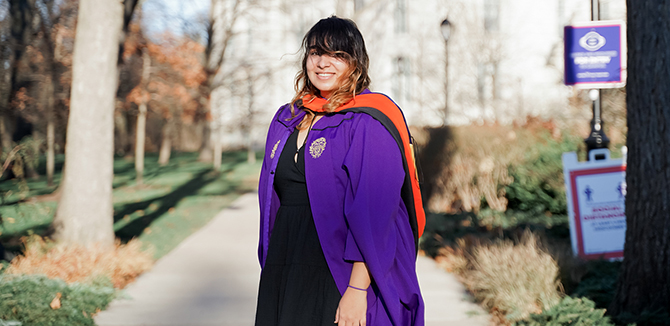Continuing to Learn as a ML Engineer
Nayan Mehta talks about how the MSAI program prepared her for her current role at xMentium.

Nayan Mehta (MSAI ‘20) was new to the world of machine learning (ML) when she started work on a project aimed at making YouTube more accessible for those with hearing loss.
The mission was close to her heart. As someone with single-sided deafness, she understood the challenges faced by people with hearing impairments.
Mehta explored the basics of Natural Language Processing, a branch of artificial intelligence (AI) that helps computers understand the way communicate. The result was a paper outlining modules to aid in the early development of language and communication skills for those with hearing loss – and a new direction for her career.
“Through this project, I worked with several students and witnessed their confused expressions transform into cheerful smiles as they discovered a whole new way of consuming content," said Mehta, whose work on that project inspired her to apply to Northwestern Engineering's Master of Science in Artificial Intelligence (MSAI) program. “I believe that the profound impact machine learning can create in this space is truly unparalleled. A child previously confined to classroom learning heavily reliant on their teacher can now learn from content at their own pace, enabling a newfound freedom”
Today, Mehta explores the capabilities of machine learning in a different industry. As principal machine learning engineer on the emerging technologies team at xMentium, Mehta supports the company’s featured product — a legal language collaboration tool that helps legal teams navigate complex negotiations to reach deals advantageous to both sides.
Mehta’s role is to ethically manage the growth of the xMentium platform. MSAI helped her with learning tangible skills and hands-on experience for this role. During her time in the program, Mehta interned in AI operations at the company she now helps grow.
“My summer internship at xMentium was instrumental in paving the way for my full-time position,” she said. “The internship functioned as an intensive training experience where I worked on a low-risk project that taught me how to translate and apply AI research in legal contexts, making it accessible to non-technical audiences.”
That accessibility is of paramount importance to Mehta, who believes that the most successful machine learning engineers are those who serve as a bridge between domain experts and the underlying technology they are using.
She also believes that public perception about AI and ML needs to change. People shouldn't worry about AI superseding human intelligence, she said. It is designed to be an asset for people and not a competitor.
ML engineers like herself can play a key role in making that happen.
"Building trust in AI systems necessitates transparency in AI decision-making so users can assess why specific results are produced and make an informed decision about how they choose to use AI in their work,"
Mehta also believes that it is up to her — at least to a certain extent — to help push for more regulations when it comes to AI. Technology is evolving at a breakneck speed. To build and sustain trust requires more than just transparency, she said.
"Considering the rapid growth of our field, there is currently a gross lack of governance surrounding AI," Mehta said. "This indirectly places more responsibility on practitioners to make ethical choices regarding data and model creation, as well as to advocate for transparency and explainability in AI decision-making processes.
Mehta is up to the challenge, thanks to MSAI. Three years removed from the program, she still remembers the lessons she learned about generating ideas for tools based on reading research papers, in addition to creating pipelines using incomplete data sets.
Perhaps most important to her experience was the people she connected with — from her classmates all the way up to MSAI director Kristian Hammond, who is on the advisory board of xMentium.
"The MSAI family is a close-knit group and the connections established during the program will last long after graduation," she said. "The MSAI family will always have your back. The connections from your course really do go far beyond the classroom."

